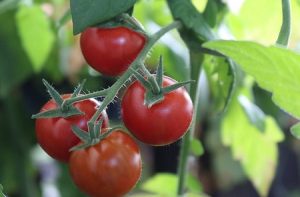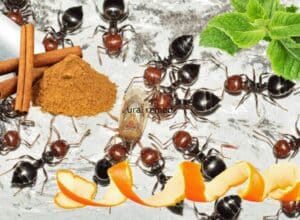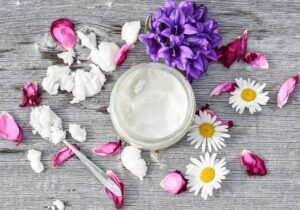Last Updated on October 17, 2023
What are herbs, exactly? Are herbs spices? Are herbs vegetables? What are the benefits of growing your own herbs? Get all confusing questions about herbs answered.
Let’s dispel confusion around the definition of herb.
As you know, herbs can be used
- to flavor food
- to ease common ailments
- to add aroma in fragrances
And because different parts of the plant are used in different applications, there is not much clarity about what the term “herb”actually means.
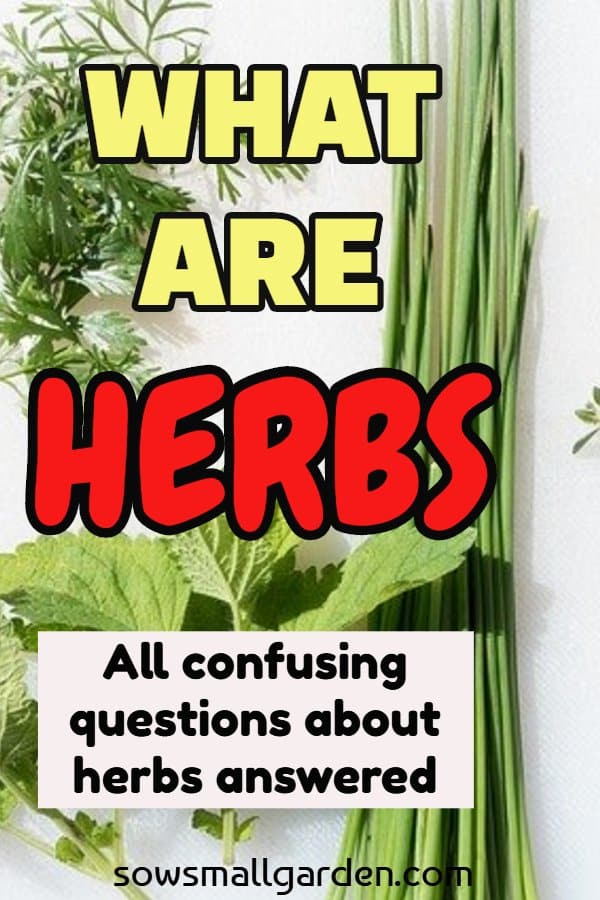
*This post contains affiliate links. If you choose to purchase any of the products I have recommended, I may receive a commission at no cost to you.
What are herbs? What does herb mean?
Botanically speaking, an herb is a plant with leaves and soft stems that dies annually to the ground at the end of the growing season.
In medicine and fragrance industry applications, the word “herb” refers to a whole plant – stem, leaves, seeds, and flowers included.
Examples: lavender, calendula, echinacea.
In this case the definition from Oxford dictionary applies: “herb – any plant with leaves, seeds, or flowers used for flavouring, food, medicine, or perfume.”
Difference between herbs and spices
Unlike in medicine, in culinary herbs mean flavorful leaves of plants used for seasoning and flavoring food.
For example: parsley, rosemary, thyme, chives, bay laurel.
As you can see, these aromatic leaves can have different shapes and grow on plants with soft or woody stems (but by the botanical definition the herb must have a soft stem).
Now, you may ask, what in culinary are the other flavorful parts of plants called?
Turns out, they are spices.

Are herbs spices?
Spices are derived from a part of a plant other than the leaves: from the seeds, root, fruit, or bark.
For example, coriander are seeds of cilantro plants, cinnamon is the inner bark of the Cinnamomum tree.
From a culinary point of view, herbs are not spices. For culinary purposes herbs are the leaves of the plant, all the other parts of the plant used for seasoning are called spices.
So now when you hear the phrase “culinary herbs and spices”, you know what they are talking about, and what is the difference between herbs and spices.
And the last commonly asked question to discuss to clear confusion about herbs:
Are herbs vegetables?
Remember, that botanically,
- fruits are seeds with surrounding tissues
- vegetables are the rest of the plant: such as the roots, leaves, stem.
And because herbs in culinary application are the flavorful leaves of plants, that makes them a subset of vegetables.
Though, unlike leafy vegetables (for example, lettuce, cabbage, or spinach) the leaves of herbs can be used just in little amounts for flavoring and aromatics, not as the main ingredient. You cannot cook and eat a bowl of dill like you would do with collards or kale.
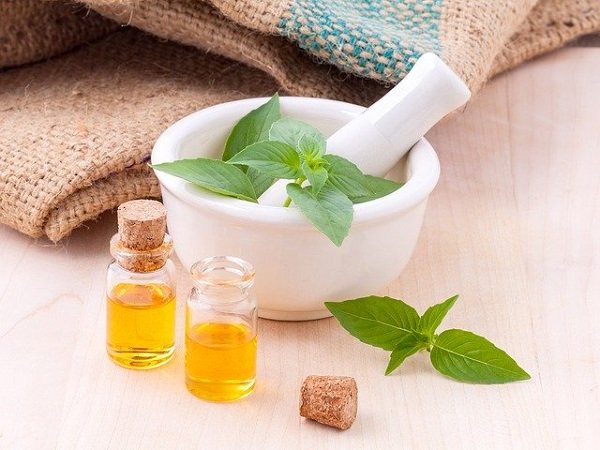
So, now that we are clear about what herbs are, let’s discuss shortly the advantages of growing your own herbs.
Benefits of growing your own herbs and spices garden
- You always have a fresh supply on hand when needed.
- Freshly picked culinary herbs bring brightness to many dishes. They can give fresh flavor even to a boring frozen dinner or canned soup.
- Growing your own medicinal herbs that can be used for easing common ailments and ensure their authenticity (and the problem of buying fake herb supplements is real.)
- The fragrance of herbs is therapeutic. According to scientific studies, the scent of aromatic herbs uplifts your mood, affects your emotional wellbeing in a positive way, and can be used for mental, spiritual and physical healing. Fragrant herbs make your garden and house smell great too!
- The majority of herbs are easy to grow and many of them are perennials – plant once and harvest for many years to come.
- Herbs are ideal for small spaces – they can be easily grown in a potager, raised beds, square garden, and containers: indoor and outdoor.
Are you convinced to start your small herb garden? I bet you are!😊
And to help you on the journey, I compiled a list of 40 culinary, medicinal and aromatic herbs with a short description of growing requirements, plant care and herb uses. Don’t forget to bookmark this article as a reference.
Related reading:
Discover more articles about herbs

I hope you got your answer on what herbs are, and will never be confused about the difference between herbs and spices again. And maybe, just maybe, and this is a Garden Lady’s hope 😊, you got inspired to plant your own culinary and healing garden.
I wish you fun and success on your gardening journey!
You have read:


